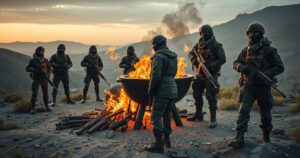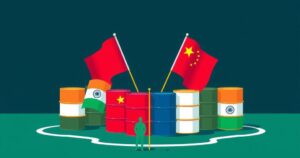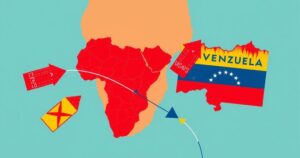Iran Cautions European Nations Against New Sanctions on Nuclear Deal

Iran warned European powers against triggering sanctions related to the nuclear deal amid ongoing talks with the US. Foreign Minister Abbas Araghchi cautioned of severe consequences, while emphasizing Iran’s willingness for dialogue. The US, led by Trump’s envoy, insists on total dismantling of enrichment, contrasting with Iran’s stance on retaining its program.
On May 11, Iran issued a serious warning to European nations involved in the 2015 nuclear deal, cautioning them against leveraging the snapback mechanism outlined in the Joint Comprehensive Plan of Action (JCPOA). This warning comes at a critical time, coinciding with the conclusion of a fourth round of nuclear negotiations with the United States in Oman, as reported by IRNA on May 12.
Iran’s Foreign Minister, Abbas Araghchi, took to social media to express his concern regarding the actions of the UK, France, and Germany, collectively known as the E3. He noted that any misuse of the snapback provision to reimpose UN sanctions could lead to “irreversible consequences,” possibly signaling the end of Europe’s involvement in the agreement. Despite these warnings, he reiterated that the Islamic Republic remains open to diplomacy and even suggested traveling to European capitals to facilitate dialogue, which has already led to preliminary discussions at the deputy level.
The context for this warning must consider the US’s withdrawal from the JCPOA in 2018 under former President Donald Trump. Since taking office again in January, Trump has issued repeated threats, including potential military action against Iran’s nuclear program, unless a new agreement is reached.
Araghchi’s comments came shortly after he published an op-ed in the French publication Le Point, where he accused Europe of engaging in risky maneuvers. He warned that triggering the snapback mechanism could incite a “global non-proliferation crisis” with Europe likely facing the brunt of adverse effects.
Meanwhile, the Iranian and US delegations engaged in a three-hour discussion in Muscat, Oman, marking the fourth session discussing Iran’s nuclear ambitions, facilitated by Omani Foreign Minister Badr al-Busaidi. While the negotiations were mostly indirect, Iran’s Foreign Ministry characterized the discussions as “difficult but useful,” while the US team, led by Trump’s envoy Steve Witkoff, confirmed plans for further technical discussions in upcoming meetings.
These talks unfolded just days before Trump’s anticipated visit to the region and seek to address Iran’s nuclear capabilities in exchange for partial sanctions relief. However, it’s clear that the negotiations are mired in complex disagreements. Iran insists on maintaining its uranium enrichment program, viewing it as a matter of national sovereignty. Conversely, the US demands the complete dismantling of Iran’s enrichment infrastructure as a prerequisite.
In a televised interview following the negotiations, Araghchi emphasized the significance of Iran’s enrichment program, stating, “The blood of our nuclear scientists fuels our program.” He mentioned that while Iran might agree to specific limitations akin to previous agreements, it will never fully abandon enrichment.
Contrarily, Witkoff underscored, in an interview with Breitbart, that any prospective agreement would necessitate an end to all enrichment activities, including the dismantling of major facilities such as Natanz, Fordow, and Isfahan. This illustrates the challenging landscape of negotiations as both sides seek to navigate their diverging red lines.
In summary, Iran’s Foreign Minister Abbas Araghchi has issued a strong warning to the E3 about the consequences of invoking the snapback mechanism for sanctions, emphasizing the potential irreparability of their actions on Europe’s role in the nuclear deal. As negotiations continue amidst significant tensions over enrichment terms, both sides remain at an impasse, highlighting the complexities involved in reaching a new agreement. The situation remains fluid as both Iran and the US prepare for further discussions while grappling with starkly different positions regarding nuclear capabilities.
Original Source: thecradle.co






